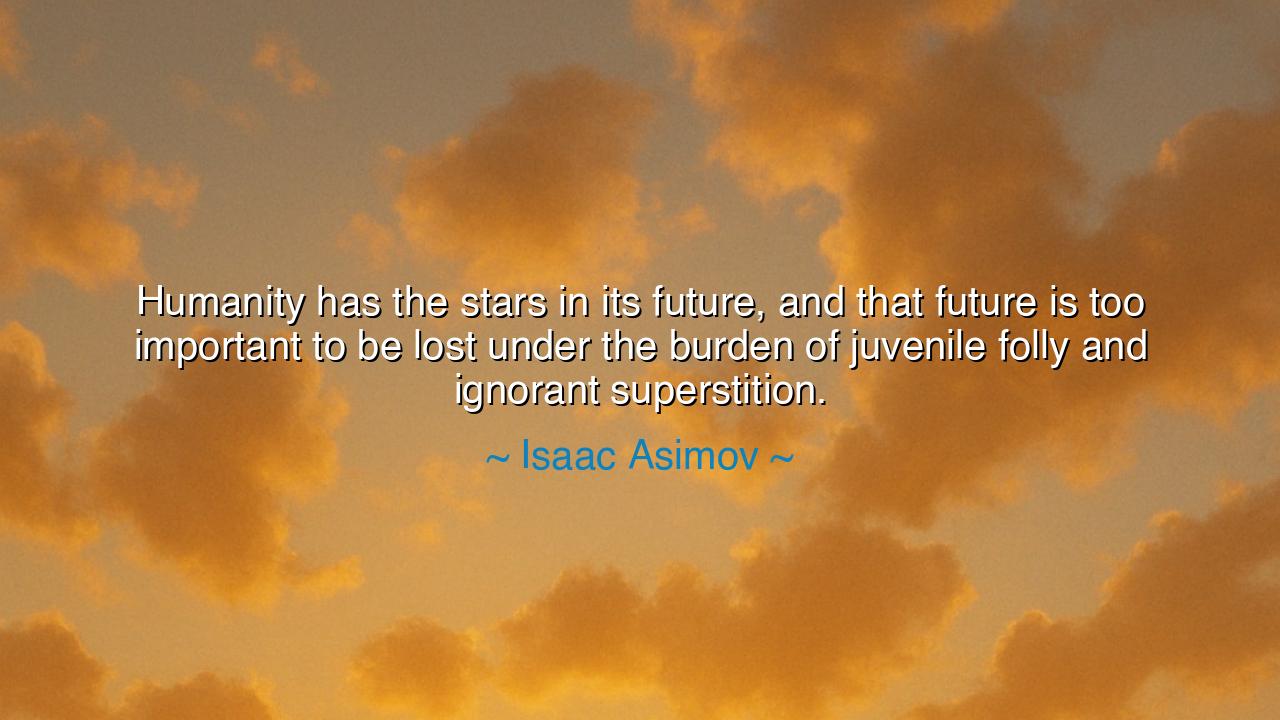
Humanity has the stars in its future, and that future is too
Humanity has the stars in its future, and that future is too important to be lost under the burden of juvenile folly and ignorant superstition.






“Humanity has the stars in its future, and that future is too important to be lost under the burden of juvenile folly and ignorant superstition.” Thus spoke Isaac Asimov, the sage of science and imagination, whose words still thunder like prophecy across the ages. In this declaration, he offers not merely a vision of space exploration, but a warning—a sacred plea to the generations of humankind: do not let fear, ignorance, and immaturity destroy the destiny that is written among the stars. His voice, though born in the age of rockets and reason, echoes the wisdom of the ancients who first lifted their gaze to the night sky and saw not darkness, but possibility.
The origin of this quote lies in Asimov’s lifelong devotion to the advancement of knowledge and the preservation of reason. A writer, scientist, and philosopher, he lived at the dawn of the space age, when humanity first broke free from the cradle of Earth. He saw in those moments—the launch of Sputnik, the landing on the Moon—not only triumphs of technology but revelations of purpose. To Asimov, the human story was always reaching upward, toward discovery and enlightenment. Yet he also saw the shadows—superstition, willful ignorance, and folly—forces that could chain us to the ground and erase all progress. His words are both a celebration and a warning: the stars await, but only if we rise in wisdom.
When Asimov speaks of “juvenile folly,” he means the reckless impulses that keep humankind small—the pettiness of conflict, the pride that blinds, the hunger for power that consumes truth. And when he warns against “ignorant superstition,” he does not condemn faith, but the refusal to seek knowledge, the surrender of reason to fear. For he knew, as all great thinkers have known, that ignorance is the true darkness of the world. It is not the stars that frighten us—it is the shadows we create within our own minds. He saw how civilization could destroy itself not by lack of brilliance, but by lack of wisdom. The mind that could build a spaceship could also build its own ruin if guided by arrogance or hatred.
Consider the story of the Library of Alexandria, that beacon of human knowledge long ago consumed by flames. Within its walls were the dreams and discoveries of centuries—maps of the heavens, studies of the stars, works of philosophy and mathematics. Yet ignorance and fear, cloaked in the guise of righteousness, brought it to ruin. The loss of that knowledge cast humanity into centuries of darkness. Asimov, a man who revered that lost library, feared that the same could happen again—not by fire alone, but by neglect, by the slow decay of curiosity. His warning is clear: if we allow superstition to triumph over science, or arrogance over understanding, we risk not just losing the stars, but losing ourselves.
Yet within his warning lies a flame of hope. Asimov believed deeply in the capacity of humankind to evolve—to rise above its primitive impulses and embrace the destiny of reason. He saw in every child’s wonder, every scientist’s experiment, every act of imagination, the blueprint for our ascent. For him, the stars were more than distant lights; they were symbols of what humanity could become when guided by courage, intellect, and compassion. The journey to the stars, in truth, is not merely a voyage through space—it is the journey of the soul toward enlightenment.
To reach that destiny, we must cast off the burdens Asimov warned of. Superstition must give way to inquiry, fear to curiosity, division to unity. The cosmos does not belong to any one nation or people—it belongs to all who dare to learn. The wise among us will see that science is not cold machinery, but the poetry of truth—the language through which creation reveals itself. Every telescope, every experiment, every dream of exploration is an act of reverence, a prayer not to the gods above, but to the potential within.
So, my listener, take this as your lesson: do not dwell in the shadows of ignorance or cling to the childish comforts of fear. Seek truth with humility, for it is the light that will guide you to the stars. Cultivate wisdom, not only in mind but in heart, for intellect without empathy is as dangerous as superstition without thought. Stand with those who question, who build, who dream—and you will stand with the architects of the future.
For as Isaac Asimov proclaimed, humanity’s destiny lies not in the soil beneath our feet, but in the heavens above. The stars are our inheritance—but only if we prove ourselves worthy. Let us then rise, casting aside the chains of folly and ignorance, and reach upward, not merely with rockets and machines, but with wisdom, courage, and unity of spirit. For the future is vast, and the light of understanding—if we protect it—will lead us beyond the darkness of our age, into the eternal dawn of the cosmos.






AAdministratorAdministrator
Welcome, honored guests. Please leave a comment, we will respond soon